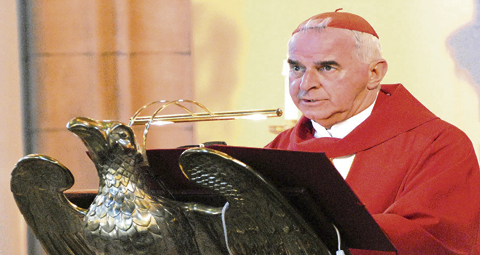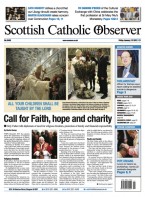BY Ian Dunn | November 18 2011 | ![]() 0 COMMENTS
0 COMMENTS ![]() print
print

Do not devalue democracy
Publication Date: 2011-11-18
Cardinal O’Brien calls on politicians to raise their game; seeks Catholic perseverance on new Missal translation
The president of the Bishops’ Conference of Scotland will use his homily on the feast of Christ the King, this Sunday, to warn politicians that ‘insulting, demeaning and attacking one another’ devalues democracy.
The hard-hitting message from Cardinal Keith O’Brien, Britain’s most senior Catholic clergyman, which the SCO has seen in advance, includes the warning ‘when ordinary citizens hear their politicians speak coarsely and with malice they become disillusioned not just of them but of the political process itself.’
Speaking up
On Sunday Cardinal O’Brien will say ‘charity and compassion’ are all too rare in amongst politicians today and Catholics should be guided by their Faith in speaking up for moral values like marriage, even though they may be abused for it.
“May our strong faith show itself in our Christian actions,” he will say. “In the ways in which we uphold and pass on our Christian moral values, especially with regard to marriage and family life; and eventually bear fruit and values by which all will live in our country.”
It is not only Catholics who are the victims of intemperate language, according to the cardinal.
“In recent weeks, many people have been dismayed on a number of occasions to read of politicians insulting, demeaning and attacking one another in the most intemperate way,” his homily notes. “All too often these exchanges result in too much heat and too little light, they devalue our politics and degrade discussion.”
The cardinal believes that many members of the electorate are turned off by political ‘slanging matches’ and do not vote. He also flags up that the recent bad example set by Scottish politicians may to lead to an overall drop in ‘standards of politeness and decorum,’ especially among the young. He believes that the Scottish public wants ‘their politicians to be constructive, collaborative and charitable.’
“This is required more than ever in our world of today when so very many critical issues are discussed. Robust debates are good for democracy; rudeness and discourtesy are not,” he says in his homily.
Behaviour and reactions
While the cardinal has not cited specific examples of politicians acting ‘coarsely and with malice,’ recent heated exchanges have been documented, particularly surrounding Scottish independence, anti-sectarian legislation and same-sex ‘marriage’ proposals.
The SNP MSP John Mason was branded a ‘bigot’ by a member of his own party for tabling a motion at Holyrood that said no one should be ‘forced to be involved in’ same-sex ‘marriages.’ In another incident Labour MP Ian Davidson claimed the SNP were a ‘neo-fascist’ party. Yet the cardinal’s message prompted a mixed response from politicians this week.
Bill Kidd, senior SNP whip, was supportive of the cardinal’s position. “Instead of scaremongering or petty attacks the electorate deserve serious, informed debate that takes place in a calm and constructive manner,” he said.
However, while Willie Rennie MSP, leader of the Scottish Liberal Democrats, agreed with the cardinal that ‘there is a clear difference between outright abuse and and vigorous debate’ he also said ‘colourful language’ was a political necessity.
“Politicians are sometimes guilty of going too far, using words like racist and fascist, which in my view is entirely wrong,” he said. “However, we need to continue to use colourful language to energise debates so that the wider Scottish public, not just the political bubble, get engaged and involved.”
A Labour spokesman said: “Robust, honest and open debate is part and parcel of politics, but as Cardinal O’Brien points out personal attacks have no place whatsoever in politics, nor do cynical and dishonest attempts to smear political rivals.”
New Missal translation
The cardinal’s homily also recognises that this Sunday is the last Sunday Scottish Catholics will celebrate the Mass many have grown up with.
“Today for the last time we use words that have been dear to us and precious to us as, from next, Sunday the full implementation of the new translation of the Roman Missal takes place,” he will say. “As we leave those previous words behind we know that for us the coming weeks and months will be a time of adaptation as we seek to get used to new phrases; but with perseverance these new words will become part of our prayer life and will help to continue our development in faith.”
The cardinal will say that it was the beginning of a ‘new era.’ “The new translation of the Roman Missal, which is the fruit of a remarkable cooperation of the Holy See, the bishops and experts from all over the world, is intended to enrich and deepen the sacrifice of praise offered to God by His people,” he will say. “Make every effort to help Catechists and musicians in their respective preparations to render the celebration of the Roman Rite in your dioceses a moment of greater grace and beauty, worthy of the Lord and spiritually enriching for everyone.”











